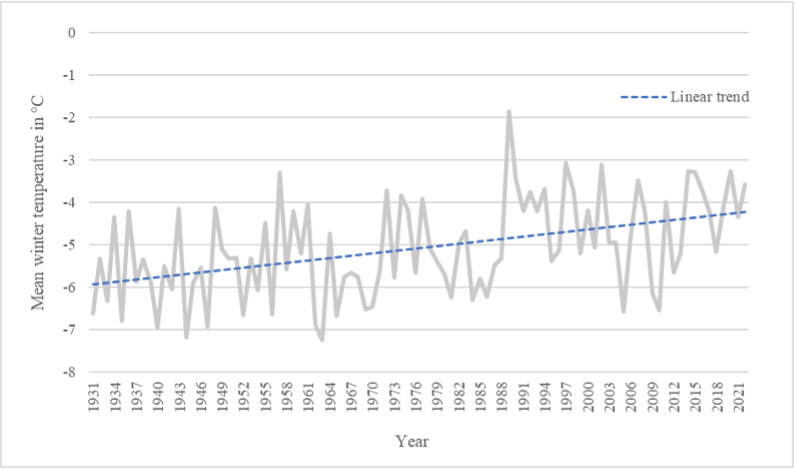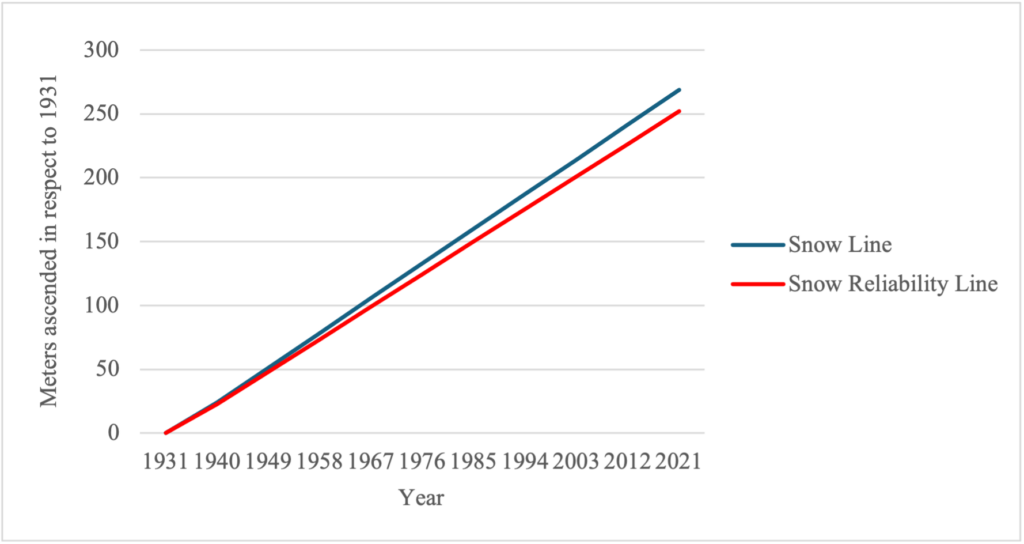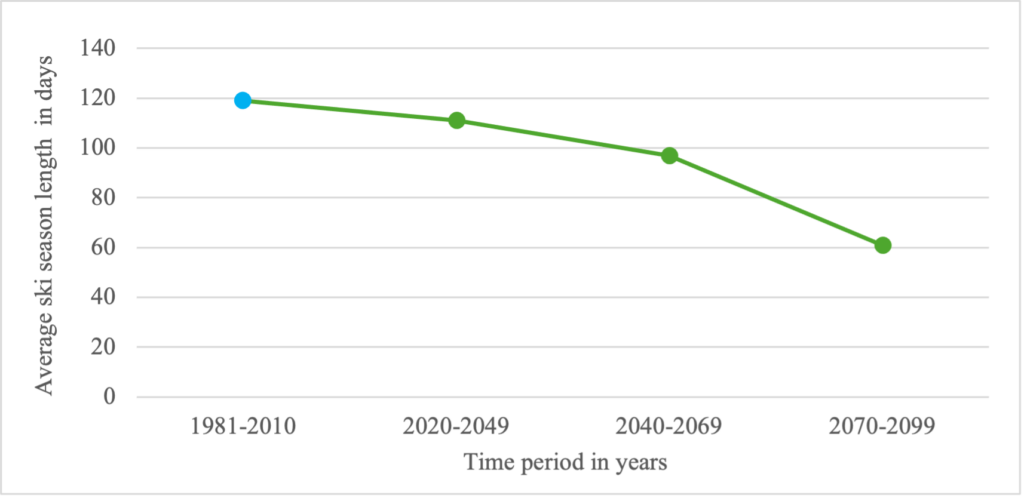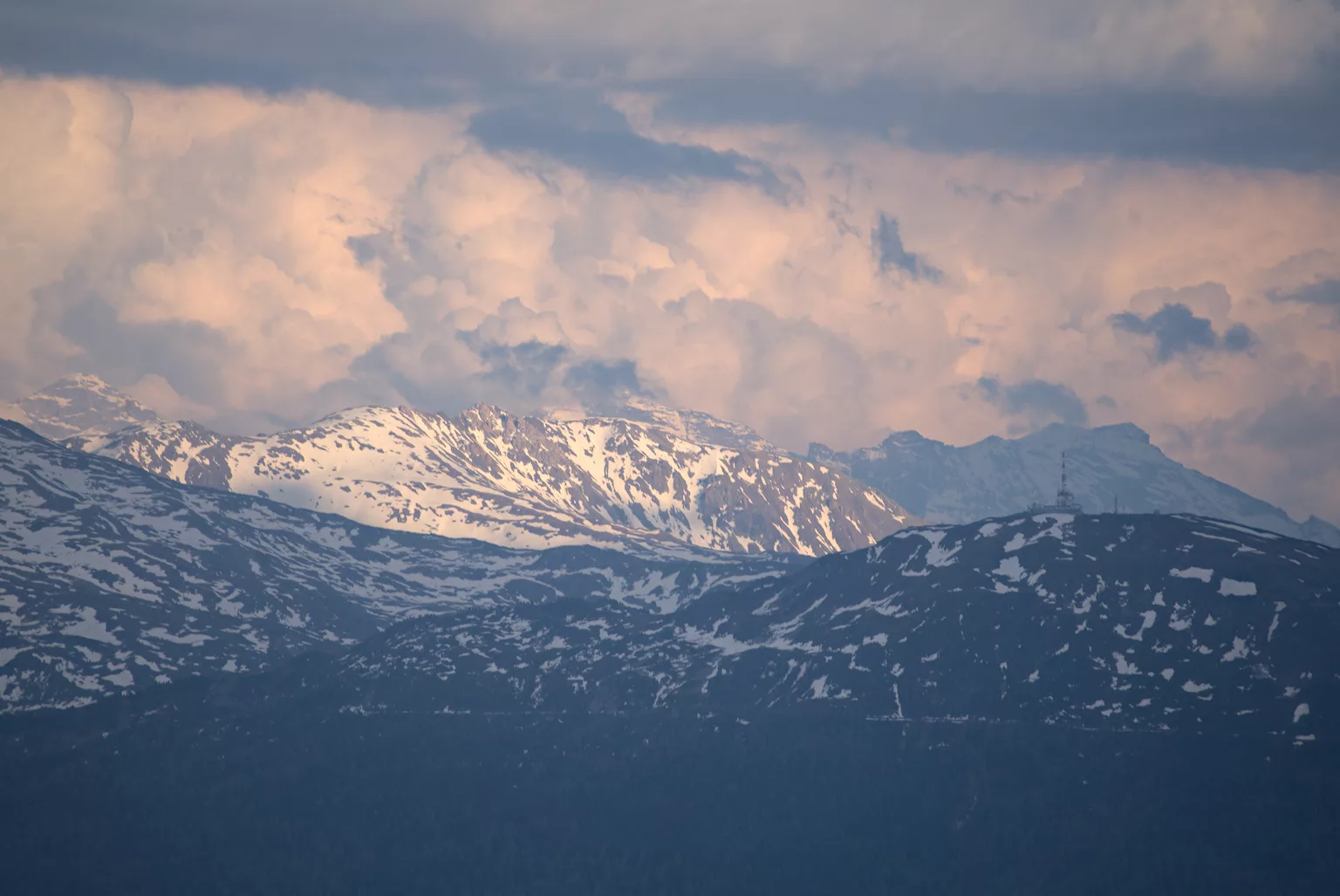POW-Award Platz 2: The impact of snow scarcity on ski tourism in Tyrol
One focus of POW’s work is the promotion of climate education for young people. A special part of the educational programme is the annual POW-Award, which is handed out by a jury for outstanding pre-scientific papers on the topics of climate change, winter sports and tourism. Second place in 2024 was given to Ben Bleser from Akademisches Gymnasium in Innsbruck. In the following blog article he has summarized his work for us:
My paper examines the impact of snow scarcity on ski tourism in the Tyrolean Alpine region. The subject at hand comprises three separate but interrelated parts that build upon each other: The climatic conditions prevailing in the region, the effects of these conditions on ski tourism and the adaptation strategies of Tyrolean ski areas to the climatic conditions and their implications. The main findings are that the climatic conditions in the Tyrolean Alpine region have been aggravating, characterized by rising temperatures and the reduction in snow cover and snow reliability, which has been negatively affecting ski tourism in various ways. In response, the ski areas are compelled to undergo adaptive measures. This includes artificial snowmaking, but also alternative strategies that may be more promising for the future.
What are the climatic conditions in the Tyrolean Alpine region?
The climatic conditions in the Tyrolean Alpine region, or rather their past and future alteration, are assessed by means of the change in annual mean winter temperature over the past 91 years (i.e. the period from 1931 to 2022). In this regard, it is to be noted that in the paper of reference the term climatic conditions is understood as the impact of global warming on snow cover and snow reliability, with snow scarcity referring to the reduction and scarcity of the latter two.
Snow cover is defined as the layer of snow that covers the ground at a given time, encompassing both depth and spatial coverage (Brown & Robinson, 2005). Snow cover also includes the snow line, which is the level at a mountain above which there is a permanent snow cover (Britannica, 2010). Snow reliability is the ability of a ski area to provide a season length of at least one hundred days or uninterrupted operation during the Christmas and New Year holidays for seven out of ten seasons (Steiger & Scott, 2019). The concept of snow reliability includes a crucial component known as the snow reliability line (Spandre, et al., 2019). The snow reliability line designates the altitude above which the conditions of snow reliability are met (Spandre, et al., 2019).

The evaluation of the temperature data (Figure 1) reveals that, on average, the winters in the Tyrolean Alpine region have warmed by 1.7°C since 1931. The decisive finding that gives this assessment its significance is that elevated temperatures in winter prompt snow scarcity (Steiger, 2011). In light of the trend in Figure 1, one can thus infer that the rising mean winter temperature has significantly increased the severity of this phenomenon and may continue to do so in the future, assuming a business-as-usual scenario.
Another crucial aspect with regard to the climatic conditions in Tyrol is that the effects of rising temperatures are especially pronounced at lower altitudes (Walker, 2022). This is illustrated in the paper by calculations on the altitude shift of the snow line and snow reliability line, respectively. Accordingly, Figure 2 shows how many meters in altitude the snow line and the snow reliability line of the individual years have ascended in respect to the year 1931.

What impact does snow scarcity have on the viability of the ski areas in the Tyrolean Alpine region?
Skiing is both a blessing and a curse for Tyrol, as it is its main economic driver on the one hand, but also the tourism market that is most exposed to climate change on the other (Hruby, 2020) (Dannevig, Gildestad, Steiger, & Scott, 2020). Needless to say, the ski tourism industry depends heavily on favorable snow conditions, which are becoming incrementally rare (Vaghefi, Muccione, van Ginkel, & Haasnoot, 2021).
The implications of snow scarcity on the viability of the ski areas in Tyrol are to be viewed from two perspectives, as the reductions in snow cover and snow reliability have individual effects. The decreasing snow reliability, as per definition, results in shorter ski seasons, whereas the dwindling snow cover leads to diminishing visitor numbers due to the lower quality and quantity of snow (Steiger & Scott, 2019) (Steiger, Damm, Prettenthaler, & Pröbstl-Haider, 2020). For the ski areas this means forfeiting profits and recording financial losses (Climate Foresight, 2023). Moreover, not least illuminated by the ascending snow line and snow reliability line, ski resorts at low elevations are particularly affected (Walker, 2022).

How do the ski areas in the Tyrolean Alpine region adapt to snow scarcity?
Artificial snowmaking, a widely implemented adaptation measure in Austria, has the potential to mitigate snow scarcity; however, the effectiveness of this approach, and therefore the realization of its potential, is increasingly constrained by rising temperatures (Steiger & Scott, 2019) (Müller, Steiger, Peters, & Veulliet, 2013). Ultimately, this prompts ski areas in the Tyrolean Alpine region to place greater emphasis on alternative adaptation strategies, which are more viable and profitable (Walker, 2022).
The alternative adaptation strategies for the present and future largely focus on product diversification, i.e. investing in and concentrating on other, non-snow-based activities and offers (Hruby, 2020). According to experts, especially the enhancement of destination attractiveness in the summer months is a popular means of adapting to snow scarcity in Tyrol and is even considered a long-term strategy (Steiger, Damm, Prettenthaler, & Pröbstl-Haider, 2020).
Case study: Ski Juwel Alpbachtal Wildschönau
The Ski Juwel Alpbachtal Wildschönau ski area serves as an illustrative example of how ski areas at low altitudes (i.e. below 2,000 masl) in the Tyrolean Alpine region are adapting to snow scarcity. Overall, the findings on the adaptation strategy of the Alpbachtal ski area highlight some aspects of the findings on the region as a whole, but also contribute to a more nuanced view of the issue.
According to the managing director of Alpbacher Bergbahn, Reinhard Wieser, the ski resort relies primarily on artificial snowmaking as a means of adapting to the above-mentioned conditions (Wieser, 2023). Aware of the challenges from rising temperatures to snowmaking, the operators trust that ongoing technical improvements will ensure their ability to adapt (Wieser, 2023). As things stand at present, Wieser is therefore confident that the ski area will be able to compensate for snow scarcity through snow production (Wieser, 2023). Notwithstanding, an alternative scenario in the strategy of Ski Juwel Alpbachtal Wildschönau is to extend the summer season to compensate for financial losses during the winter season, as well as to implement alternative offers to skiing in order to bridge snow deficient periods (Wieser, 2023).
Ben Bleser was awarded second place in the POW-Award 2024.


